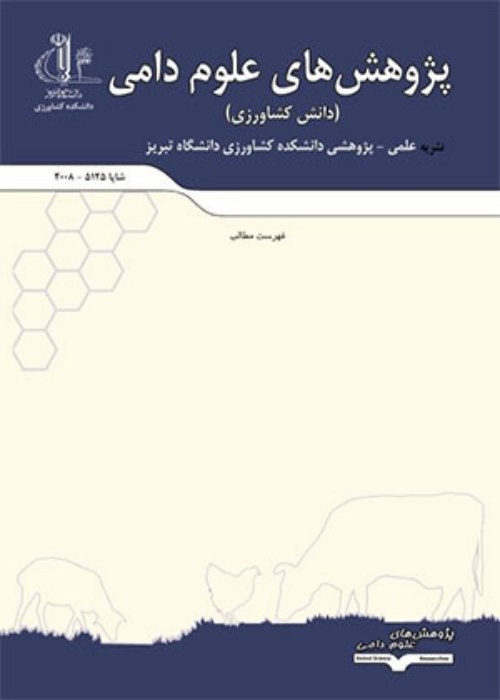Compare the effect of different levels of nano-selenium on digestion and fermentation parameters of rumen microorganisms of sheep and goat
Author(s):
Article Type:
Research/Original Article (دارای رتبه معتبر)
Abstract:
Introduction
Generally, most feeds used in livestock nutrition are deficient in some nutrients, and require nutritional supplements. Among the supplements, micro and macro minerals are particular importance. Selenium (Se) plays an important role in the reproductive function and immune system and is known as an antioxidant and catalyst for the production of thyroid hormone. It is believed that low selenium absorption in ruminants is due to the deficiency of selenium in ration and its conversion into insoluble form (Peterson and Spedding 1963; Surai 2006). Nano-particles are smaller and more active than larger particles. The importance of Selenium for rumen microorganisms are not entirely clear. The present experiment was conducted to evaluate the effect of nano-selenium on activity of whole population of microorganisms, bacteria and fungi, which isolated from the rumen liquid of sheep and goats. Material and
Methods
The experimental sample in the present experiment was a basal diet including: 29% barley grain, 25% wheat bran, 20% wheat straw, 25% corn silage, 1% selenium-free mineral-vitamin supplement. In the present experiment 0, 0.2, 0.4 and 0.6 ppm nano-Se was added to the basal standard diet of sheep and goats, then digestibility and fermentation parameters of diets were measured by the rumen fluid of sheep and goats in vitro. The rumen fluid was taken through the stomach tube from four Najdi goat and Arabi sheep before the morning meal, mixed separately, filtered using four layers of cheesecloth, and potted in a flask content warm water. These animals were fed with a diet, approximately similar to basal ration, but without selenium, about three weeks. Gas production of the basal diet containing different levels of nano-Se was determined using the Menke and Steingass (1988) in six replications. The rumen fluid was mixed with artificial saliva (1:2 ratio, respectively) in lab, and then nano-Se levels added to it. The gas production was recorded at zero, 2, 4, 6, 8, 12, 24, 48, 72 and 96 hours after the start of incubation in water bath. The gas production data were analyzed using the exponential model and the gas production parameters were calculated (Ørskov and McDonald, 1979). Two steps digestion (Tilley and Terry 1963) method in six replications was used to measure digestibility of experimental diets. The rumen fluid and buffer was prepared as mentioned for gas production experiment. Isolation and purification of bacteria and fungi, and studying the effect of nano selenium on their digestibile activity conducted by preparing the specific medium cultures of ruminal anaerobic bacteria or fungi according to recommended method (Zhang et al., 2007; Mohammadabadi et al. 2012).Results And Discussion
The highest digestibility of dry matter (DM) and neutral detergent fiber (NDF) of experimental diets in sheep and goats were for the level of 0.6 ppm nano-Se that was higher than control diet (PConclusion
Therefore, the use of nano-Se resulted to increase digestibility and fermentation of nutrients by whole rumen microorganisms and bacteria of both species. Keywords:
Language:
Persian
Published:
Journal of Animal Science Research, Volume:27 Issue: 4, 2018
Pages:
183 to 199
magiran.com/p1814889
دانلود و مطالعه متن این مقاله با یکی از روشهای زیر امکان پذیر است:
اشتراک شخصی
با عضویت و پرداخت آنلاین حق اشتراک یکساله به مبلغ 1,390,000ريال میتوانید 70 عنوان مطلب دانلود کنید!
اشتراک سازمانی
به کتابخانه دانشگاه یا محل کار خود پیشنهاد کنید تا اشتراک سازمانی این پایگاه را برای دسترسی نامحدود همه کاربران به متن مطالب تهیه نمایند!
توجه!
- حق عضویت دریافتی صرف حمایت از نشریات عضو و نگهداری، تکمیل و توسعه مگیران میشود.
- پرداخت حق اشتراک و دانلود مقالات اجازه بازنشر آن در سایر رسانههای چاپی و دیجیتال را به کاربر نمیدهد.
In order to view content subscription is required
Personal subscription
Subscribe magiran.com for 70 € euros via PayPal and download 70 articles during a year.
Organization subscription
Please contact us to subscribe your university or library for unlimited access!



